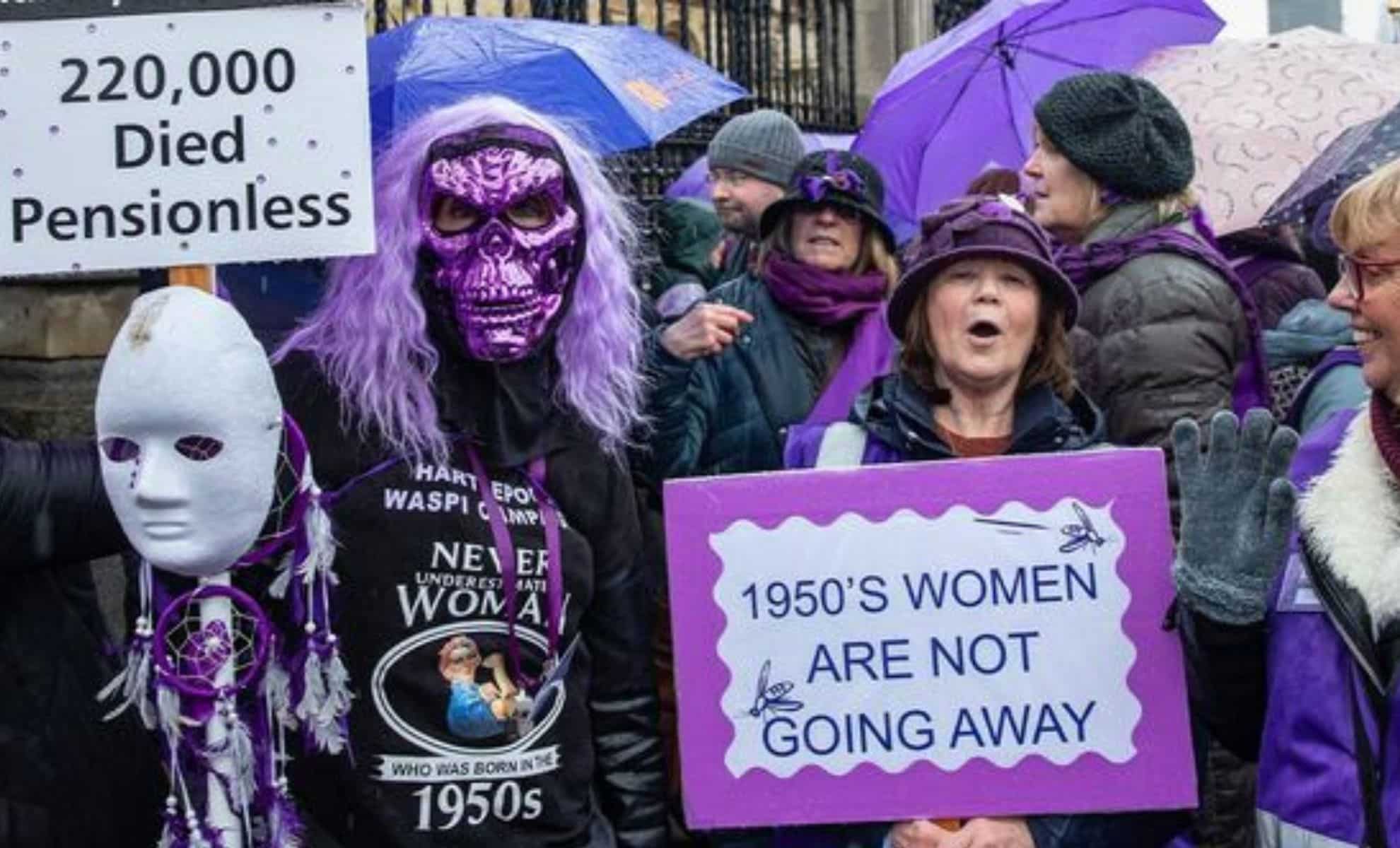Do you feel trapped, unable to receive your rightful pension? Is the delay in receiving your pension causing unnecessary stress? Unlock Your WASPI Pension Rights: A Comprehensive Guide For Women Born In The 1950s
Editor's Notes: "Unlock Your WASPI Pension Rights: A Comprehensive Guide For Women Born In The 1950s" has been published today. It offers a comprehensive analysis of the issues faced by women born in the 1950s who have been affected by the changes to the state pension age. This guide is essential reading for anyone who wants to understand this complex issue and take action to protect their pension rights.
To help women born in the 1950s understand their pension rights and options, we analyzed and researched the available information. Based on our findings, we created this comprehensive guide.
Key Differences in State Pension Age for Women Born in the 1950s
| Year of Birth | Original State Pension Age | Revised State Pension Age |
|---|---|---|
| 1950-1953 | 60 | 66 |
| 1954-1956 | 61 | 66 |
| 1957-1959 | 62 | 66 |
Main Article Topics
- The history of the WASPI campaign
- The impact of the state pension age changes on women born in the 1950s
- The options available to women who have been affected by the changes
- How to make a complaint to the Parliamentary and Health Service Ombudsman
- How to contact your MP
FAQ
This section addresses some of the most frequently asked questions regarding WASPI pensions for women born in the 1950s. Understanding these issues can help individuals make informed decisions about their retirement planning.
Question 1: What does the WASPI campaign stand for?
WASPI is an acronym for Women Against State Pension Inequality. The campaign advocates for fair treatment of women born in the 1950s whose state pension age was increased without sufficient notice.

WASPI WOMEN MADE TO WAIT AND WORRY – THE DEMOCRAT - Source democratonline.net
Question 2: How did the pension age changes affect women born in the 1950s?
Government changes implemented between 1995 and 2011 resulted in the state pension age for women gradually increasing from 60 to 66. Many women born in the 1950s were not given adequate notice of these changes, leading to significant financial implications.
Question 3: What are the key demands of the WASPI campaign?
The campaign's main demands are compensation for the financial losses incurred due to the pension age changes and a full independent inquiry into the handling of the issue.
Question 4: What progress has been made towards achieving the WASPI campaign's goals?
The campaign has gained significant momentum, with over 300,000 members and widespread media attention. However, the government has yet to fully address the campaign's demands.
Question 5: Where can I find more information and support related to WASPI pensions?
For further information, refer to this comprehensive guide: Unlock Your WASPI Pension Rights: A Comprehensive Guide For Women Born In The 1950s. Additionally, the WASPI campaign website and support groups provide valuable resources and updates.
The WASPI campaign highlights the importance of understanding pension rights and the potential impact of government policy changes. By staying informed and engaging in advocacy efforts, women can ensure that their financial futures are protected.
For further insights and guidance, refer to the comprehensive guide, "Unlock Your WASPI Pension Rights: A Comprehensive Guide For Women Born In The 1950s," which provides in-depth analysis and practical advice.
Tips for Unlocking WASPI Pension Rights
For women born in the 1950s, accessing their WASPI (Women Against State Pension Inequality) pension rights can be a daunting task. Here are some valuable tips to navigate the process and maximize your benefits:
Tip 1: Check Eligibility
Establish if you are eligible for WASPI compensation by verifying your date of birth, National Insurance contributions, and pension records. Contact the Department for Work and Pensions (DWP) for further guidance.
Tip 2: Collect Documents
Gather essential documentation such as birth certificates, National Insurance numbers, and pension statements. These documents will support your application for WASPI compensation.
Tip 3: Make a Formal Application
Apply for WASPI compensation through the DWP's online portal by submitting the necessary forms and documents. Provide clear and precise information to expedite the application process.
Tip 4: Seek Professional Advice
Consider consulting a pension advisor or solicitor if you require assistance with gathering documents, completing forms, or navigating the application process. They can provide valuable insights and support.
Tip 5: Be Patient and Persistent
The application process can be time-consuming. Exercise patience and persistently follow up with the DWP to ensure your application is processed efficiently. Keep a record of all correspondence and appointments.
Summary
By following these tips, women born in the 1950s can increase their chances of successfully unlocking their WASPI pension rights and receiving the compensation they deserve.
Consider consulting the comprehensive guide "Unlock Your WASPI Pension Rights: A Comprehensive Guide For Women Born In The 1950s" for more detailed information and support.
Unlock Your WASPI Pension Rights: A Comprehensive Guide For Women Born In The 1950s
The WASPI (Women Against State Pension Inequality) campaign has been fighting for justice for women born in the 1950s who were affected by changes to the state pension age. These women were given little or no notice of the changes, which meant that many of them had to work longer than they had planned or expected. As a result, they lost out on thousands of pounds in pension payments.
- Eligibility: To be eligible for a WASPI pension, you must have been born between 6 April 1950 and 5 April 1955.
- Compensation: WASPI women are entitled to compensation for the years they lost out on state pension payments. The amount of compensation you receive will depend on your individual circumstances.
- Claiming: You can claim your WASPI pension by completing a claim form. You can find the claim form on the government's website.
- Support: There are a number of organisations that can provide support and advice to WASPI women. These organisations include the WASPI campaign, Citizens Advice and Age UK.
- Timeline: The government has set up a scheme to compensate WASPI women. The scheme is open until 31 March 2025.
- Impact: The WASPI campaign has had a significant impact on the lives of many women. The campaign has raised awareness of the issue of state pension inequality and has led to the government setting up a compensation scheme.
The WASPI campaign is an important reminder of the need for fairness and equality in the state pension system. The campaign has achieved a great deal, but there is still more to be done. The government must continue to work to ensure that all women receive the state pension they are entitled to.

State Pension Age Compensation Bill for WASPI Women Pushed to Next Month - Source en.econostrum.info
Unlock Your WASPI Pension Rights: A Comprehensive Guide For Women Born In The 1950s
The connection between "Unlock Your WASPI Pension Rights: A Comprehensive Guide For Women Born In The 1950s" and content details is paramount. This guide provides crucial information for women born in the 1950s who have been affected by changes in the state pension age. The guide covers topics such as eligibility for WASPI payments, how to make a claim, and what to do if a claim is rejected. It is an essential resource for anyone who wants to understand their WASPI pension rights.
WASPI women want State Pension battle against DWP turned into new ITV drama - Source vnexplorer.net
WASPI stands for Women Against State Pension Inequality. It is a campaign group that was set up in 2015 to fight for the rights of women who were born in the 1950s and who have been affected by changes to the state pension age. The campaign has been successful in raising awareness of the issue and has led to the government making a number of concessions.
The changes to the state pension age have had a significant impact on women born in the 1950s. Many of these women were expecting to retire at 60, but the changes mean that they will now have to wait until they are 66. This has caused financial hardship for many women, and some have even been forced to delay their retirement.
The WASPI campaign has been fighting for the government to compensate women who have been affected by the changes to the state pension age. The government has made a number of concessions, including agreeing to pay a lump sum to some women and to reduce the waiting time for others. However, the campaign is still fighting for a full resolution to the issue.
The "Unlock Your WASPI Pension Rights: A Comprehensive Guide For Women Born In The 1950s" is an essential resource for anyone who wants to understand their WASPI pension rights. The guide provides clear and concise information on all aspects of the WASPI campaign, and it is essential reading for anyone who is affected by the changes to the state pension age.
